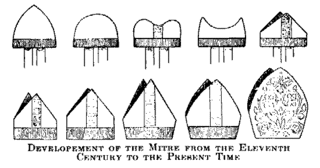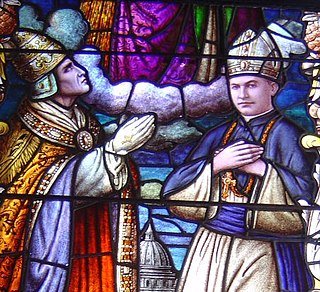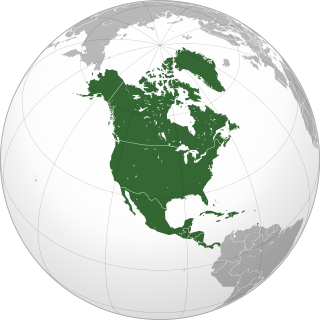
An episcopal polity is a hierarchical form of church governance in which the chief local authorities are called bishops. It is the structure used by many of the major Christian Churches and denominations, such as the Roman Catholic, Eastern Orthodox, Oriental Orthodox, Church of the East, Anglican, and Lutheran churches or denominations, and other churches founded independently from these lineages.

Methodism, also known as the Methodist movement, is a group of historically related denominations of Protestant Christianity which derive their practice and belief from the life and teachings of John Wesley. George Whitefield and John's brother Charles Wesley were also significant early leaders in the movement. It originated as a revival movement within the 18th-century Church of England and became a separate denomination after Wesley's death. The movement spread throughout the British Empire, the United States, and beyond because of vigorous missionary work, today claiming approximately 80 million adherents worldwide.
The United Methodist Church (UMC) is a mainline Protestant denomination and a major part of Methodism. In the 19th century, its main predecessor, the Methodist Episcopal Church, was a leader in evangelicalism. The present denomination was founded in 1968 in Dallas, Texas, by union of The Methodist Church and the Evangelical United Brethren Church. The UMC traces its roots back to the revival movement of John and Charles Wesley in England, as well as the Great Awakening in the United States. As such, the church's theological orientation is decidedly Wesleyan. It embraces liturgical, holiness, and evangelical elements.

The word diocese is derived from the Greek term dioikesis (διοίκησις) meaning "administration". Today, when used in an ecclesiastical sense, it refers to the ecclesiastical district under the jurisdiction of a bishop. Sometimes it is also called bishopric.
This is a directory of patriarchs, archbishops, and bishops across various Christian denominations. To find an individual who was a bishop, see the most relevant article linked below or Category:Bishops.
The African Union First Colored Methodist Protestant Church and Connection, usually called "the A.U.M.P. Church," is a Methodist denomination. It was chartered by Peter Spencer (1782–1843) in Wilmington, Delaware, in 1813 as the "Union Church of Africans," where it became known as the "African Union Church".

The Methodist Episcopal Church (MEC) was the oldest and largest Methodist denomination in the United States from its founding in 1784 until 1939. It was also the first religious denomination in the US to organize itself on a national basis. In 1939, the MEC reunited with two breakaway Methodist denominations to form the Methodist Church. In 1968, the Methodist Church merged with the Evangelical United Brethren Church to form the United Methodist Church.

Richard Allen was a minister, educator, writer, and one of America's most active and influential black leaders. In 1794, he founded the African Methodist Episcopal Church (AME), the first independent black denomination in the United States. He opened his first AME church in 1794 in Philadelphia, Pennsylvania.

The African Methodist Episcopal Church, usually called the A.M.E. Church or AME, is a predominantly African-American Methodist denomination. It is the first independent Protestant denomination to be founded by black people. It was founded by the Rt. Rev. Richard Allen in Philadelphia, Pennsylvania, in 1816 from several black Methodist congregations in the mid-Atlantic area that wanted independence from white Methodists. It was among the first denominations in the United States to be founded on racial rather than theological distinctions and has persistently advocated for the civil and human rights of African Americans through social improvement, religious autonomy, and political engagement. Allen, a deacon in Methodist Episcopal Church, was consecrated its first bishop in 1816 by a conference of five churches from Philadelphia to Baltimore. The denomination then expanded west and south, particularly after the Civil War. By 1906, the AME had a membership of about 500,000, more than the combined total of the Colored Methodist Episcopal Church in America and the African Methodist Episcopal Zion Church, making it the largest major African-American Methodist denomination. The AME currently has 20 districts, each with its own bishop: 13 are based in the United States, mostly in the South, while seven are based in Africa. The global membership of the AME is around 2.5 million and it remains one of the largest Methodist denominations in the world.

The Christian Methodist Episcopal (C.M.E.) Church is a historically black denomination within the broader context of Methodism. It is also occasionally considered to be a mainline denomination. The group was organized on December 16, 1870 in Jackson, Tennessee, when several black ministers, with the full support of their white sponsors in the former Methodist Episcopal Church, South, met to form an organization that would allow them to establish and maintain their own polity. They ordained their own bishops and ministers without their being officially endorsed or appointed by the white-dominated body. They called this fellowship the Colored Methodist Episcopal Church in America, which it remained until their successors adopted the current name in the 1950s.

The African Methodist Episcopal Zion Church, or the AME Zion Church or AMEZ, is a historically African-American Christian denomination based in the United States. It was officially formed in 1821 in New York City, but operated for a number of years before then.
A missionary bishop is one assigned in the Anglican Communion to an area that is not already organized under a bishop of a church. The term was also used in the Methodist churches at one time, but this was discontinued in 1964.

Leontine Turpeau Current Kelly was an American bishop of the United Methodist Church. She was born in Washington, D.C., one of eight children. Her father, David D. Turpeau Sr., was a prominent Methodist minister, who later served four terms in the Ohio House of Representatives. For a period of time she also served simultaneously as a pastor and a District Superintendent. Her mother, Ila Marshall Turpeau, was an outspoken advocate for women and Blacks and a founder of the Urban League of Cincinnati, Ohio. Kelly died on June 28, 2012 in Oakland, California.

Thomas Coke was the first Methodist bishop and is known as the Father of Methodist Missions.
An episcopal area in the United Methodist Church (UMC) is a basic unit of this denomination. It is a region presided over by a resident bishop that is similar to a diocese in other Christian denominations. Each annual conference in the UMC is within a single episcopal area; some episcopal areas include more than one annual conference. Episcopal areas are found in the United States as well as internationally. In some cases, such as the Western Jurisdiction of the US as well as some places internationally, an episcopal area covers a very large territory.

Methodist viewpoints concerning homosexuality are diverse because there is no one denomination which represents all Methodists. The World Methodist Council, which represents most Methodist denominations, has no official statements regarding sexuality. British Methodism holds a variety of views, and permits ministers to bless same-gender marriages. American Methodism concentrates on the position that the same-sex relations are incompatible with "Christian teaching", but extends ministry to persons of a homosexual orientation, holding that all individuals are of sacred worth. The following denominations are members of the World Methodist Council.

Wesleyan theology, otherwise known as Wesleyan–Arminian theology, or Methodist theology, is a theological tradition in Protestant Christianity that emphasizes the "methods" of the eighteenth-century evangelical reformers John Wesley and his brother Charles Wesley. More broadly, it refers to the theological system inferred from the various sermons, theological treatises, letters, journals, diaries, hymns, and other spiritual writings of the Wesleys and their contemporary coadjutors such as John William Fletcher.
Marjorie Swank Matthews was an American bishop of the United Methodist Church.

The history of Methodism in the United States dates back to the mid-18th century with the ministries of early Methodist preachers such as Laurence Coughlan and Robert Strawbridge. Following the American Revolution most of the Anglican clergy who had been in America came back to England. John Wesley, the founder of Methodism, sent Thomas Coke to America where he and Francis Asbury founded the Methodist Episcopal Church, which was to later establish itself as the largest denomination in America during the 19th century.










